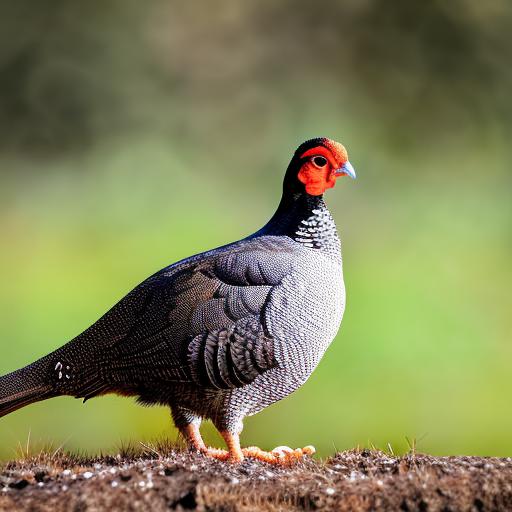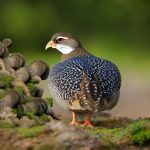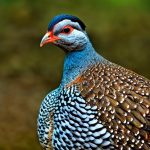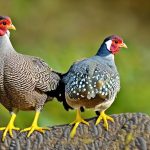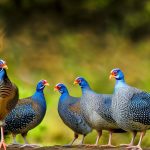Vulturine Guinea Fowl, also known as Acryllium vulturinum, are striking and unique birds native to East Africa. They are easily recognizable by their vibrant blue plumage, white spots, and a distinct vulture-like appearance. These birds are highly social and are often found in large flocks in their natural habitat. Vulturine Guinea Fowl are popular for their striking appearance and their ability to thrive in a variety of environments, making them an attractive option for avian enthusiasts and hobbyists.
Vulturine Guinea Fowl are known for their bold and confident nature, making them a captivating addition to any aviary or backyard setting. They are highly active birds and are known for their strong flying abilities, making them a joy to watch as they move about their environment. These birds are also known for their distinct vocalizations, which can range from soft clucking to loud calls, adding an interesting dynamic to any outdoor space. With their striking appearance and engaging behavior, Vulturine Guinea Fowl make for a captivating and unique addition to any avian collection.
Key Takeaways
- Vulturine Guinea Fowl are striking birds known for their vibrant blue plumage and unique appearance.
- When housing Vulturine Guinea Fowl, it’s important to provide a spacious enclosure with plenty of room to roam and forage.
- A balanced diet for Vulturine Guinea Fowl should include a mix of seeds, insects, and greens, along with access to grit for digestion.
- Regular health check-ups and access to a knowledgeable avian veterinarian are essential for maintaining the well-being of Vulturine Guinea Fowl.
- Breeding Vulturine Guinea Fowl requires careful monitoring of nesting behavior and providing a safe and quiet environment for successful reproduction.
Housing and Enclosure Requirements
When it comes to housing Vulturine Guinea Fowl, it’s important to provide them with a spacious and secure enclosure that allows them to exhibit their natural behaviors. A large aviary or outdoor enclosure with plenty of room to roam and fly is ideal for these active birds. The enclosure should be at least 100 square feet per bird to ensure they have enough space to move around comfortably. It’s important to provide ample perches and roosting areas for the birds to rest and feel secure.
The enclosure should also be equipped with shelters or hiding spots to provide the birds with protection from the elements and potential predators. Additionally, the enclosure should be surrounded by a secure fence or barrier to prevent the birds from escaping and to keep out potential predators. Providing a natural substrate such as grass or dirt will allow the birds to engage in natural behaviors such as dust bathing and foraging. Overall, creating a spacious and secure environment for Vulturine Guinea Fowl is essential for their health and well-being.
Feeding and Nutrition
When it comes to feeding Vulturine Guinea Fowl, it’s important to provide them with a well-balanced diet that meets their nutritional needs. These birds are omnivorous and enjoy a varied diet consisting of seeds, grains, insects, and small invertebrates. A commercial game bird feed can serve as the base of their diet, supplemented with fresh fruits and vegetables such as leafy greens, carrots, and berries. It’s important to provide access to grit or small stones to aid in digestion, as well as access to clean water at all times.
In addition to their primary diet, Vulturine Guinea Fowl will also benefit from opportunities to forage for insects and other small prey items in their enclosure. This not only provides them with mental stimulation but also allows them to exhibit natural behaviors. It’s important to monitor their food intake and adjust portion sizes as needed to prevent obesity or malnutrition. Providing a well-rounded and varied diet is essential for the overall health and vitality of Vulturine Guinea Fowl.
Health and Veterinary Care
Maintaining the health of Vulturine Guinea Fowl is essential for their overall well-being. Regular health checks by a qualified avian veterinarian are recommended to monitor for any signs of illness or disease. It’s important to observe the birds daily for any changes in behavior, appetite, or physical appearance that may indicate a health issue. Additionally, providing a clean and well-maintained environment will help prevent the spread of disease and parasites.
Preventative measures such as regular deworming and vaccinations can help protect Vulturine Guinea Fowl from common avian illnesses. It’s important to provide a balanced diet, clean water, and access to natural sunlight to support their immune system and overall health. In the event of an illness or injury, prompt veterinary care is crucial to ensure the best possible outcome for the birds. By prioritizing their health and providing proper veterinary care, Vulturine Guinea Fowl can thrive in a captive setting.
Breeding and Reproduction
Breeding Vulturine Guinea Fowl can be a rewarding experience for avian enthusiasts. These birds typically reach sexual maturity at around 2 years of age and will form monogamous pairs during the breeding season. Providing a spacious and naturalistic environment with ample hiding spots and nesting materials will encourage breeding behavior. The female will lay a clutch of eggs in a concealed nest site, typically laying one egg every other day until the clutch is complete.
It’s important to provide the breeding pair with privacy and minimal disturbance during the incubation period, which lasts approximately 24-28 days. Once the eggs hatch, the chicks will require warmth, protection, and access to a high-protein diet to support their growth and development. Providing a safe and secure environment for the breeding pair and their offspring is essential for successful reproduction. With proper care and attention, Vulturine Guinea Fowl can successfully breed in captivity, adding an exciting dimension to avian husbandry.
Behavioral Enrichment and Socialization
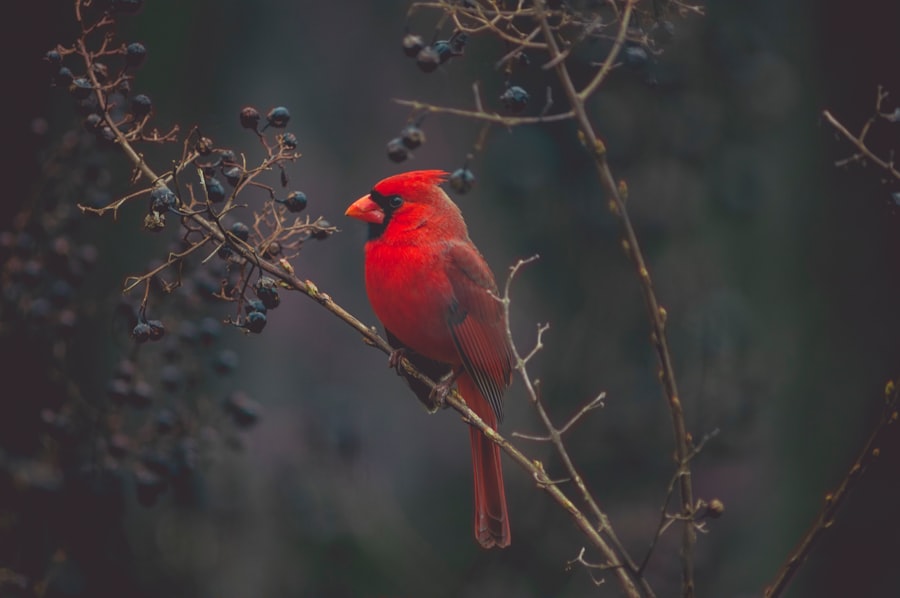
Vulturine Guinea Fowl are highly social birds that thrive in the company of their own kind. Providing them with opportunities for socialization and interaction is essential for their mental well-being. These birds are known for their playful nature and enjoy engaging in activities such as dust bathing, foraging, and exploring their environment. Providing them with natural substrates such as dirt or sand will allow them to engage in these natural behaviors.
In addition to physical enrichment, providing mental stimulation is also important for Vulturine Guinea Fowl. This can be achieved through the use of puzzle feeders, hanging toys, or hiding treats within their enclosure to encourage natural foraging behavior. Additionally, providing opportunities for flight and exercise will help keep these active birds mentally and physically stimulated. By prioritizing behavioral enrichment and socialization, Vulturine Guinea Fowl can lead fulfilling lives in captivity.
Tips for Keeping Vulturine Guinea Fowl as Pets
For those considering keeping Vulturine Guinea Fowl as pets, there are several important tips to keep in mind. Firstly, it’s important to provide these birds with a spacious outdoor enclosure that allows them to exhibit natural behaviors such as flying, dust bathing, and foraging. Additionally, providing ample hiding spots, perches, and roosting areas will help create a secure and enriching environment for the birds.
Feeding a well-balanced diet consisting of commercial game bird feed supplemented with fresh fruits, vegetables, and opportunities for natural foraging is essential for their health and vitality. Regular veterinary care, including health checks and preventative measures such as deworming and vaccinations, will help ensure the overall well-being of Vulturine Guinea Fowl. Lastly, prioritizing behavioral enrichment and socialization will help keep these social birds mentally stimulated and content in a captive setting.
In conclusion, Vulturine Guinea Fowl are captivating birds known for their striking appearance, engaging behavior, and social nature. By providing them with a spacious and secure enclosure, a well-balanced diet, proper veterinary care, opportunities for breeding, behavioral enrichment, and socialization, these birds can thrive in a captive setting. With proper care and attention, Vulturine Guinea Fowl can make fascinating additions to avian collections and provide endless enjoyment for avian enthusiasts.
Looking to create the perfect environment for your vulturine guinea fowl? Check out Poultry Wizard’s article on chicken coop run plans for inspiration on designing a safe and spacious outdoor area for your birds. A well-designed coop and run can provide the ideal space for your guinea fowl to thrive.
FAQs
What are vulturine guinea fowl?
Vulturine guinea fowl (Acryllium vulturinum) are a species of large, strikingly beautiful guinea fowl native to East Africa. They are known for their unique appearance, with blue facial skin, a white stripe down their neck, and a long, elegant tail.
What do vulturine guinea fowl eat?
In the wild, vulturine guinea fowl primarily feed on a diet of seeds, fruits, insects, and small invertebrates. In captivity, they can be fed a diet of commercial game bird feed supplemented with fresh fruits and vegetables.
How do you keep vulturine guinea fowl?
Vulturine guinea fowl require a large, spacious aviary with plenty of room to roam and forage. They are social birds and should be kept in small flocks. The aviary should be well-secured to protect the birds from predators.
What are the temperature requirements for vulturine guinea fowl?
Vulturine guinea fowl are adapted to warm, dry climates and are sensitive to cold temperatures. They should be provided with a sheltered, warm environment, especially during the winter months.
Are vulturine guinea fowl noisy?
Vulturine guinea fowl are known for their loud, raucous calls, especially during the breeding season. They can be noisy birds, so it’s important to consider this when keeping them in a residential area.
Do vulturine guinea fowl require any special care?
Vulturine guinea fowl are relatively low-maintenance birds, but they do require access to dust baths for grooming and parasite control. They also need regular access to fresh water for drinking and bathing. Regular health checks and parasite control are also important for their well-being.
Meet Walter, the feathered-friend fanatic of Florida! Nestled in the sunshine state, Walter struts through life with his feathered companions, clucking his way to happiness. With a coop that’s fancier than a five-star hotel, he’s the Don Juan of the chicken world. When he’s not teaching his hens to do the cha-cha, you’ll find him in a heated debate with his prized rooster, Sir Clucks-a-Lot. Walter’s poultry passion is no yolk; he’s the sunny-side-up guy you never knew you needed in your flock of friends!

